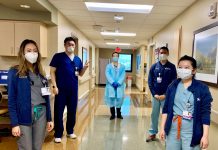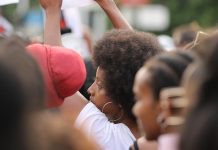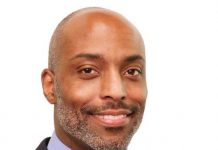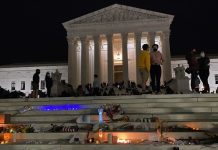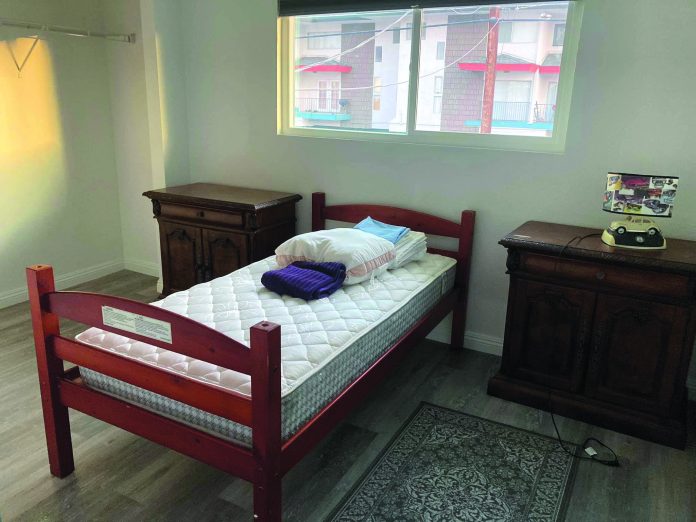Two new LGBTQIA housing units for vulnerable persons, which flowed from the love of two gay men for each other, have now opened in Las Vegas. A third building may be in the works.
Bright Star Foundation owns and operates two four-plexes in an area near the Boulevard Mall, just off Maryland Parkway. The buildings have 17 bedrooms that are rented at subsidized rates in an effort to provide stable housing to individuals who might otherwise be homeless. Las Vegas has one of the highest rates of unaccompanied and unsheltered youth in the country and 40 percent of homeless youth identify as LGBTQIA.
There is an equally serious homelessness issue in the trans community and Bright Star also is working to help alleviate part of that problem.
Bright Star Foundation, conceived by Jon Gathercole and Lt. Col. Claude Raffin (USA, Ret.), provides affordable, inclusive housing for community members struggling with stable housing. Most referrals come through The LGBTQ Center of Southern Nevada, and in fact, the project’s executive director is Dr. Ray McFarlane, an employee of The Center, who splits their time between The Center and Bright Star, which reimburses The Center for their salary.
Raffin, a naturalized citizen born in France, and a Vietnam vet met Jon R. Gathercole as a flower child in the streets of 1960s-era San Francisco. Jon had moved to the city at age 17 to escape rural Oklahoma and was quickly adopted by two gay dads who became his parents of choice. He became active in the gay rights movement through the Mattachine Society and the Society for Individual Rights (SIR)
A Renaissance man, the young Gathercole excelled at handcrafts, sewing, painting, carpentry and design. Raffin was scheduled for promotion to the rank of colonel, but when the Army discovered that he was living with Jon, his general in command strongly recommended that he retire from the armed services. For the times, it was a kindness, as he could have been dishonorably discharged and lost all of his service honors and benefits.
The handsome young couple moved to Santa Barbara where they discovered their life vocation in real estate. Claude says that Jon developed lifelong friendships with the generations of families whom he helped to find homes. Claude says, “Jon had the ability to walk into a room full of strangers and leave with at least 20 new friends!”
The pair established a successful real estate agency in Santa Barbara, eventually making investments in San Diego, Texas, Utah, Arizona and Las Vegas. The couple developed a global network of friends that they would visit during their frequent travels.
Jon fell in love with his husband’s homeland and they visited annually. Jon became adopted by Claude’s family and Claude says he became “more French than me!”
Jon loved doing drag and was a passionate entertainer. He designed and handsewed a huge closet of costumes and gowns. He was also a collector of vintage cars. One of his paintings done while living in Wyoming was selected by First Lady Jacqueline Kennedy to represent the state in a national exhibition in Washington D.C.
Jon and Claude continued their social activism in the Santa Barbara gay community and were early volunteers for AIDS CAP (Counseling and Assistance Program) becoming care buddies for people living with AIDS. One young man who was dying said he was tired of getting sponge baths and wanted to take one last shower. Jon immediately stripped down and assisted the young man in the shower to help him enjoy his last wish.
In retirement the two men traveled from pole to pole but they did not forget the LGBTQIA community. Claude learned of a young gay man in Montana who was beaten and kicked out by his father when he discovered his son was gay. The sympathetic local sheriff picked up the young man, but there was no safe shelter for him except in jail.
Thinking of what they could do to help other youths avoid this horrible situation, in 2015, Claude and Jon co-founded the Bright Star Foundation to assist LGBTQIA youth without homes in the several of the Western states of the U.S.
Jon became stricken with lung cancer in 2018 and he died just months after his diagnosis at age 70. Claude and Jon had been together for 41 years. The man who others said always “made me smile” or “had me laughing,” or “left me happy” was gone, but Claude said Jon’s desire to bring happiness to others did not end with his death.
Raffin serves as the Bright Star board president and continues Jon’s vision.
The foundation offers repatriation assistance for youth who find themselves stranded, without a place to live in big cities, far from home, if there is a safe relative or friend that the young person can return home to live with.
Bright Star also assists with emergency help for youth without homes and coordinates with other homeless youth or LGBTQIA organizations, such as The Center, Shannon West and Nevada Partnership for Homeless Youth. In the past, Bright Star also helped to provide an LGBTQIA safety dorm at the Salvation Army, to provide a safer place for those in fear of experiencing homo/transphobia at the hands of other patrons.
Bright Star Foundation began working more closely with the Las Vegas LGBTQ Center (The Center) in 2018. The Center was already serving youth without homes by connecting them to services and innovating ways to help when services were not available. The collaboration helped connect Bright Star resources and youth in need who sought help at The Center.
The foundation and the Center formalized their relationship with a Memorandum of Understanding, coordinated by Macfarlane, The Center’s Trans and Gender Diversity Program manager. Macfarlane spends part of their time serving as the executive director of Bright Star Foundation, and The Center is reimbursed for a portion of her salary by Bright Star.
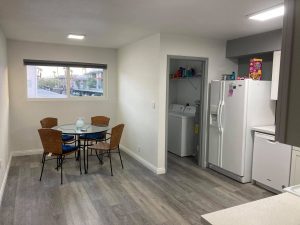
In late 2020, Bright Star, in collaboration with The Center, expanded its mission to provide more accessible, affordable and inclusive housing for vulnerable LGBTQIA people of all ages, struggling to find long-term stability.
Raffin and the Estate of Jon Gathercole purchased two four-plex apartments and then donated those buildings to Bright Star Foundation. Jon’s generous and joyful sprit lives on in the newly renovated buildings. Keeping with Claude’s French heritage and Jon’s love of France, the buildings are named Maison 1 de Jon Gathercole and Maison 2 de Jon Gathercole.
John Waldron, The Center’s CEO, said that both buildings, which opened a few months ago are already almost full, showing the need for this type of sustainable housing.
“We couldn’t be more grateful to Bright Star,” he said, “for providing safe housing for our community youth.”
Residents are expected to be self-supporting and to pay rent of $400 to $500 per resident. Bright Star works with residents to overcome barriers to housing such as lack of identification, finding enough money for security deposits or for first and last month’s rent, or the ability to prove double or triple income. Residents are assisted in finding and navigating housing and assistance resources.
The Center has hosted many LGBTQIA job fairs and over the last year-and-a-half, has worked to collect LGBTQIA inclusive job listings, help with resumes and other job support, through a grant from Bank of America. Waldron says the community can help provide support for residents in finding employment or acquiring job search skills and tools. Job listings can be shared to Facebook.com/groups/
Macfarlane says that the two buildings are a “monumental milestone” for the Las Vegas LGBTQIA community, but also “a drop in the bucket” of the need. Macfarlane said, “It is a celebration, but also a call to action.
“These buildings are the beginnings of LGBTQIA housing for Nevada, but the need is not nearly addressed. Bright Star does plan to acquire more buildings, as the housing is already nearly full. We also need to raise funds to pay off the renovation costs and acquire more housing to help more people, and to connect with grants to support the work being done.”
Waldron said that already The Center is looking for additional buildings and secure homes. He said LGBTQIA centers in other cities have secured federal grants to subsidize community housing and that The Center will also seek similar funding.
The residents’ stories tell the need that has been met.
A young couple who had recently received victims’ assistance were without shelter. The younger partner would have been able to find shelter at Shannon West, but the other partner had just aged out of the youth shelter and so the two chose to live on the street rather than be separated. Now, they can live together in sustainable housing.
Many residents either receive SSI/SSDI or work in low-income jobs. Affordable, secure housing would have been out of their reach without Bright Star and The Center. Las Vegas City Councilman Brian Knudson reached out to The Center about an elderly transwoman he had met in The Courtyard, an open-air courtyard with resources and an outdoor place to sleep. She had been robbed and lost all of her identification and documents. She needed help getting a phone to connect with family for assistance, and an apartment she could rent that would accept her income.
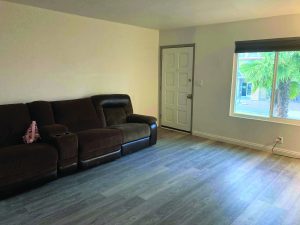
One of the first residents was Amanda Rae Nelson, a young trans woman recently from Billings, Montana.
Amanda had relocated to Billings to make a fresh start after having been savagely beaten in Florida and left in a coma for six months. While in Billings, Amanda began her transition surgery. She was active in the trans community and worked to bring a non-discrimination ordinance before the city council, which failed 5 to 2 when the mayor and the head of the council said, “I don’t got the bandwidth for this.”
Disgusted by local attitudes and with an opportunity for work in Las Vegas, Amanda relocated in August and immediately became active with The Center’s trans and binary programs. As Gary Costa with Golden Rainbow described Amanda, she “makes things happen.” She secured affordable housing in the first Maison and has since become the building’s unofficial den mother.
One family with two young children had been living in their car and monthly studio motels for over three years, unable to save enough for a deposit. Now they have a place where their children can play in a yard, and sleep in their own bedroom.
In every story, Bright Star and The Center are making a difference in people’s lives, empowering them to take control of their own lives, and have made history in starting the first LGBTQIA housing in Nevada in Jon’s name.
Editor’s note and disclosure: Rob Schlegel, publisher of the Las Vegas Spectrum, serves on the Bright Star board of directors as treasurer. “Donations to Bright Star Foundation a 501c3 charitable organization are appreciated. Checks can be mailed to Bright Star Foundation at PO Box 50041, Henderson, NV 89016. Donations can be made online at brightstargives.org by using the “Contact-Donate” drop down menu.”





